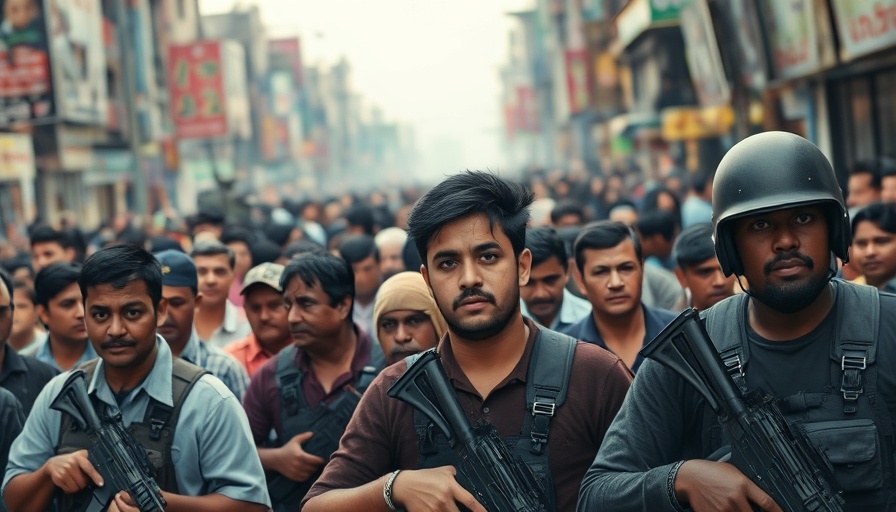
A Fragile Peace: The Stakes in the Israel-Hamas Ceasefire
The recent conflict between Israel and Hamas has left deep scars, both physically and emotionally, as families grapple with the repercussions of violence and loss. Amidst the pain, a ceasefire has been brokered, but recent developments have raised serious doubts about its sustainability.
In 'Cracks in ceasefire deal - Israel restricts aid until Hamas returns all hostage bodies,' the video delves into the complexities of the ceasefire and the repercussions for all involved, prompting a deeper exploration of its implications.
Understanding the Human Cost
On any given day, the Ikhilov Hospital in Tel Aviv echoes with stories of survival. Recently, some of the Israeli hostages, released from Hamas captivity, have begun to recount their harrowing experiences. Families who feared the worst are now experiencing bittersweet joy as they reunite with their loved ones. Yet, for many, there’s a lingering darkness, a reminder of those still held in captivity, and a reminder that these reunions come at a price. Families of the 24 remaining hostages are left with uncertainty, longing for closure amidst this fragile peace.
Cracks in the Ceasefire Agreement
The ceasefire between Israel and Hamas has been marked by tensions over the return of hostages and the aid flowing into Gaza. Israel has reportedly decided to halve the humanitarian aid entering Gaza and keep the Rafah crossing closed—actions which signal the precarious nature of the agreement.
Jeremy Bowen of the BBC highlights how Hamas’s inability to locate the graves of deceased hostages has turned into a point of contention, jeopardizing the fragile peace. The process of returning bodies is an essential part of keeping the ceasefire intact, yet confusion surrounding their recovery adds to the already tenuous situation.
The Larger Implications for Gaza
UN humanitarian efforts are also being adversely affected by this fragile ceasefire. Tom Fletcher, the UN humanitarian chief, expressed concerns about the urgent need for aid in Gaza. Viable access to aid is crucial for the more than two million Palestinians counting on assistance for their survival. The continued closing of borders could lead to a humanitarian crisis, making it more important than ever for both sides to uphold their end of the bargain.
Confronting the Challenges Ahead
The reality on the ground in Gaza shows a population desperately in need of assistance. In the aftermath of the conflict, reports of destruction rival those seen in past wartime cities, further complicating potential rebuilding efforts. Additionally, the ongoing struggles with Hamas’s disarmament and its grip on power provide an unstable environment, making any hope for lasting peace seem increasingly distant.
Political Dynamics and Future Predictions
The broader political landscape, influenced by international leaders and negotiations, plays a critical role in determining the future of Gaza and relations with Israel. As Donald Trump maintains a confident stance regarding the ceasefire, the fragility of the situation suggests that the road to lasting peace will require more than mere assurances. All parties involved must act rationally and responsibly, rather than relying on optimistic proclamations that could quickly fade.
For those of us watching from afar, it’s essential to understand that the peace we desire comes with strings attached. The complexities of returning bodies and opening borders are amidst a backdrop of deeply held resentments and fears.
The Voices of Recovery
The reunions between families like Elcana Bobbert and his wife illustrate the profound depth of human connection amidst warfare. Such emotional stories remind us of the stakes involved—not just in terms of geopolitical consequences but in terms of human lives. Each story is a testament to resilience and the will to move forward, even in the face of adversity. As these individuals work towards reintegrating into daily life, the psychological scars remain, and support systems become paramount.
Looking Forward: A Call for Collective Responsibility
As we reflect on the current state of the ceasefire, it’s an opportune moment to recognize the need for collective responsibility among global leaders, citizens, and humanitarian organizations. What happens next affects not just those directly involved but also countless others who watch, hoping for change. Open dialogue remains critical, and as more individuals express their stories, we cultivate an environment where dialogue can initiate healing—for families, for nations, and for humanity.
With this analysis of the fragile ceasefire stemming from the video 'Cracks in ceasefire deal - Israel restricts aid until Hamas returns all hostage bodies', it’s crucial for all stakeholders to strive for solutions that support both aid and safety in Gaza.
 Add Row
Add Row  Add
Add 




Write A Comment